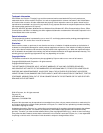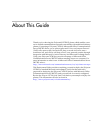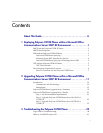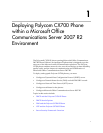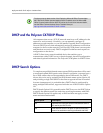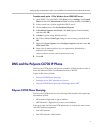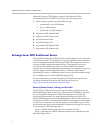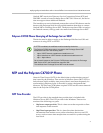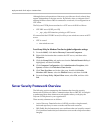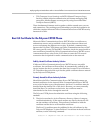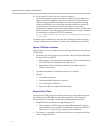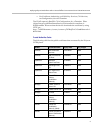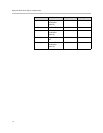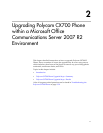
Deployment Guide for the Polycom CX700 IP Phone
4
When the Polycom CX700 phone connects to the Microsoft Office
Communications Server 2007 R2, it queries in the following order.
1. Hosts and port pointed to by these SRV records
— _sipinternaltls._tcp.<SIP domain>
— _sip._tls.<SIP domain>
— _sipinternal. tcp.<SIP domain>
2. sipinternal.<SIP domain>:5061
3. sipinternal.<SIP domain>:443
4. sip.<SIP domain>:5061
5. sip.<SIP domain>:443
6. sipexternal.<SIP domain>:5061
7. sipexternal.<SIP domain>:443
Exchange Server 2007 Autodiscover Service
Microsoft® Exchange Server 2007 includes a new Exchange service named the
Autodiscover service. The Autodiscover service configures client computers
that are running Microsoft® Office Outlook 2007. The Autodiscover service
can also configure supported mobile devices. The Autodiscover service
provides access to Exchange features for Outlook 2007 clients that are
connected to an Exchange messaging environment. The Autodiscover service
must be deployed and configured correctly for Outlook 2007 clients to
automatically connect to Exchange features, such as the offline address book,
the Availability service, and Unified Messaging (UM).
For more information, see the Exchange Server TechCenter topic How to
Configure Exchange Services for the Autodiscover Service at
http://go.microsoft.com/fwlink/?linkid=141087.
Retrieving Outlook Contacts, Call Logs, and Voice Mail
The Polycom CX700 phone retrieves Outlook contacts, call logs, and voice
mails and displays them on the device. The Polycom CX700 phone does this
by accessing the Exchange Server 2007 Client Access Server (CAS) and
retrieving the information by using Exchange Web Services (EWS). The
Polycom CX700 phone locates the Exchange Server 2007 CAS by using an A
record that is in DNS. It uses the SMTP domain of the primary e-mail address
for the user to locate the A record. The primary e-mail address is sent to the
device during the sign-in process through in-band provisioning. The A record
it is querying is in the following order.
https://<SMTP domain>/autodiscover/autodiscover.xml,
https://autodiscover.<SMTP domain>/autodiscover/autodiscover.xml,
and http/ https redirect



